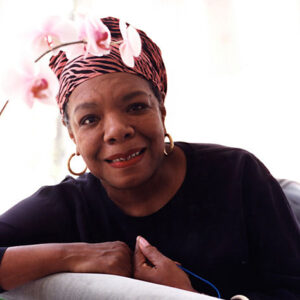calsfoundation@cals.org
I Know Why the Caged Bird Sings
Detailing her childhood in Stamps (Lafayette County), as well as in St. Louis, and San Francisco, Maya Angelou’s autobiographical novel I Know Why the Caged Bird Sings was first published in 1970 by Random House and nominated for a National Book Award. It was the first of a series of eight autobiographical novels that cemented her place as one of the great voices of African-American literature. The title of the book comes from the poem “Sympathy” by Paul Laurence Dunbar, which describes perseverance in the face of oppression.
The book chronicles the racism Maya, a young incarnation of Angelou, encountered in the segregated town of Stamps and other places she lived, along with the sexual abuse she faced at the hands of her mother’s boyfriend, Mr. Freeman. Maya has a difficult time reconciling herself to the racist actions of the whites in Stamps, who treat her and her grandmother as inferior, even though Maya’s grandmother has more money than many of the whites. Another incident involves a white dentist who refuses to treat Maya because of her race, even though Maya’s grandmother had loaned the man money during the Depression. They are forced to make the long drive to Texarkana (Miller County) to see a black dentist. Eventually, Maya goes to live with her mother and her mother’s boyfriend, who rapes Maya. When he is found dead, Maya blames herself and refuses to speak for some time.
The graphic nature of the book, which includes details of rape and abuse, was considered controversial by many, though the book has been widely hailed as a classic and even taught in grade schools. The perseverance Maya displays in her struggles against racism, sexism, and abuse shows the roots of Angelou’s later civil rights activism.
The book was later adapted into a made-for-TV movie, which was released on April 28, 1979, by Tomorrow Entertainment and aired on CBS. The screenplay was written by Angelou with Leonura Thuna. Angelou had previously written Georgia, Georgia in 1972, which was the first screenplay by an African American to be filmed. Angelou also wrote the score for both films. I Know Why the Caged Bird Sings was directed by Fielder Cook and starred Constance Good as Maya and Ruby Dee as Grandmother Baxter. The movie was filmed in Mississippi.
For additional information:
Angelou, Maya. I Know Why the Caged Bird Sings. New York: Random House, 1970.
Braxton, Joanne M. I Know Why the Caged Bird Sings: A Casebook. New York: Oxford University Press, 1999.
“I Know Why the Caged Bird Sings.” Internet Movie Database. http://imdb.com/title/tt0079321/ (accessed September 21, 2022).
Nishikawa, Kinohi. “I Know Why the Caged Bird Sings.” In The Greenwood Encyclopedia of Multiethnic American Literature, edited by Emmanuel S. Nelson. 5 vols. Westport, CT: Greenwood Press, 2005.
Williams, Mary E., ed. Readings on Maya Angelou. San Diego: Greenhaven Press, 1997.
C. L. Bledsoe
Ghoti magazine
 Arts, Culture, and Entertainment
Arts, Culture, and Entertainment Literature and Authors
Literature and Authors Maya Angelou
Maya Angelou  Maya Angelou Barbie
Maya Angelou Barbie 




Comments
No comments on this entry yet.